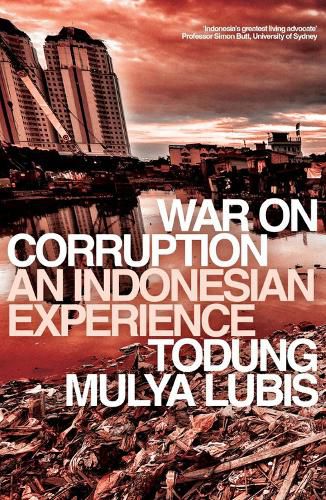Readings Newsletter
Become a Readings Member to make your shopping experience even easier.
Sign in or sign up for free!
You’re not far away from qualifying for FREE standard shipping within Australia
You’ve qualified for FREE standard shipping within Australia
The cart is loading…






War on Corruption: An Indonesian Experience is a courageous, informed, and sober insider's account of the challenge for democracy and the rule of law within the fourth most populous nation. Corruption is a huge problem in Indonesia. Some reasons are easy to identify and flow on from the authoritarianism of the Soeharto New Order. Other factors are less apparent. As Todung Mulya Lubis, one of Indonesia's leading human rights lawyers and most influential legal thinkers, explains, 'Now corruptors come from the legislature, government, judiciary, and business communities, and they are not simply thieves but rent-seekers, benefiting from rapid economic development and weak law enforcement'. In his telling, the best efforts of the most unswerving and talented corruption fighters in Indonesia have been frustrated since the Soeharto regime was overthrown a generation ago. But as Todung also shows, there have recently been many successful prosecutions of corrupt officials, from the lowest levels to the very upper echelons of government and society. The creation of the Indonesian Corruption Eradication Commission, the KPK, in 2003, was an inspired move. For all its problems, arising from both internal dynamics and the often hostile social and institutional environments in which it has operated, the legal independence and dogged idealism of the KPK have made it a genuine force for renewal.
$9.00 standard shipping within Australia
FREE standard shipping within Australia for orders over $100.00
Express & International shipping calculated at checkout
War on Corruption: An Indonesian Experience is a courageous, informed, and sober insider's account of the challenge for democracy and the rule of law within the fourth most populous nation. Corruption is a huge problem in Indonesia. Some reasons are easy to identify and flow on from the authoritarianism of the Soeharto New Order. Other factors are less apparent. As Todung Mulya Lubis, one of Indonesia's leading human rights lawyers and most influential legal thinkers, explains, 'Now corruptors come from the legislature, government, judiciary, and business communities, and they are not simply thieves but rent-seekers, benefiting from rapid economic development and weak law enforcement'. In his telling, the best efforts of the most unswerving and talented corruption fighters in Indonesia have been frustrated since the Soeharto regime was overthrown a generation ago. But as Todung also shows, there have recently been many successful prosecutions of corrupt officials, from the lowest levels to the very upper echelons of government and society. The creation of the Indonesian Corruption Eradication Commission, the KPK, in 2003, was an inspired move. For all its problems, arising from both internal dynamics and the often hostile social and institutional environments in which it has operated, the legal independence and dogged idealism of the KPK have made it a genuine force for renewal.